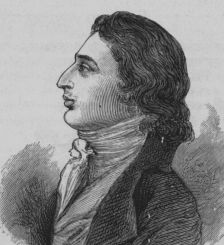
To Southey
Encyclopedia

Samuel Taylor Coleridge
Samuel Taylor Coleridge was an English poet, Romantic, literary critic and philosopher who, with his friend William Wordsworth, was a founder of the Romantic Movement in England and a member of the Lake Poets. He is probably best known for his poems The Rime of the Ancient Mariner and Kubla...
and published in the 14 January 1795 Morning Chronicle
Morning Chronicle
The Morning Chronicle was a newspaper founded in 1769 in London, England, and published under various owners until 1862. It was most notable for having been the first employer of Charles Dickens, and for publishing the articles by Henry Mayhew which were collected and published in book format in...
as part of his Sonnets on Eminent Characters
Sonnets on Eminent Characters
Sonnets on Eminent Characters or Sonnets on Eminent Contemporaries is an 11 part sonnet series created by Samuel Taylor Coleridge and printed in the Morning Chronicle between 1 December 1794 and 31 January 1795...
series. Robert Southey
Robert Southey
Robert Southey was an English poet of the Romantic school, one of the so-called "Lake Poets", and Poet Laureate for 30 years from 1813 to his death in 1843...
became a close friend of Coleridge during the summer of 1794 and the two originally formed a plan to start an ideal community together. Although the plan fell apart, Coleridge dedicated the poem to his friend and emphasized Southey's poetic abilities. Following the poem, Coleridge further drifted from Southey and the poem was not republished.
Background
Coleridge first met Southey when Coleridge was about to tour Wales during the summer of 1794. They shared similar political views and the two bonded immediately. Together, they established a plan to create a community run by the ideas of PantisocracyPantisocracy
Pantisocracy was a utopian scheme devised in 1794 by the poets Samuel Taylor Coleridge and Robert Southey for an egalitarian community...
, a system that would emphasize agriculture and communal living. To further attain this goal, they each married one of the Fricker sisters and started to make financial arrangements along with discussing with others that would join them. The two wrote many poems, with The Fall of Robespierre
The Fall of Robespierre
The Fall of Robespierre is a three-act play written by Robert Southey and Samuel Coleridge in 1794. It follows the events in France after the downfall of Maximilien Robespierre. Robespierre is portrayed as a tyrant, but Southey's contributions praise him as a destroyer of despotism...
written by both, and they planned to sell the poems to help provide money. However, Coleridge left the side of his wife and travelled to London to further his poetic career.
On 1 December 1794, the Morning Chronicle began to run a series of Coleridge's poems called Sonnets on Eminent Characters or on "Eminent Contemporaries". In a 17 December 1794 letter from Coleridge to Southey, Coleridge copied a sonnet about Southey with a note that said, "I took the Liberty—Gracious God! pardon me for the aristocratic frigidity of that expression—I indulged my Feelings by sending this among my Contemporary Sonnets". The poem was printed for the 14 January 1795 Morning Chronicle, which ran it as the tenth poem of Coleridge's series under the name "To Robert Southey, of Baliol College, Oxford, Author of the 'Retrospect,' and Other Poems". It was the only time the poem was published.
Although Coleridge and Southey continued to spend time together and collaborate on their poetic efforts, their relationship was greatly strained and their ideas for the Pantisocratic government fell apart. The change in Coleridge's opinions on both Southey and William Godwin is reflected in Coleridge's not republishing the poems on either of them within his 1796 collection of poems. However, Coleridge also omitted the poems because he did not think they were any good.
Poem
The only edition of the poem reads:- SOUTHEY! the melodies steal o'er mine ear,
- Like far off joyance, or the murmering
- Of wild Bees in the sunny show'rs of Spring—
- Sounds of such mingled import, as may cheer
- The lonely breast—yet rouse a mindful tear:
- Wak'd by the Song doth Hope-born FANCY fling
- Rich show'rs of dewy fragrance from her wing,
- 'Till sickly PASSION's drooping Myrtle's sear
- Blossom anew! But, O! more thrill'd, I prize
- Thy sadder strains, that bid in MEM'RY's Dream
- The faded forms of past Delight arise;
- Then soft, on LOVE's pale cheek, the tearful gleam
- Of Pleasures smiles—as, faint, yet beauteous lies
- The imag'd Rainbow on a willow stream. (lines 1–14)
Themes
The Sonnets on Eminent Characters contained many poems dedicated to those Coleridge considered his hero from many fields, with Southey ranking amongst them. Like the poems in the series "To Godwin" and "To Bowles", "To Southey" talks about Coleridge's personal life and Southey's involvement in it. The heroes were divided into those who were artists, intellectuals, political figures, and military figures in a way similar to Milton. In particular, Milton's sonnet on Henry Lawes ("Sonnet 13") was the model for Coleridge's poem on Southey, along with the poem "To Bowles" and "To Mrs Siddons".Like with Coleridge's feelings towards William Godwin after writing "To Godwin", Coleridge began to intellectually separate from Southey after "To Southey", and, during his lecture series in 1795, he began to stress Christianity as essential to his political beliefs. However, even within the poem, there is no direct reference to Southey's liberal political beliefs. Instead, the poem only discusses Southey as a poet. A side effect from not including the sonnet in the 1796 series is that Coleridge effectively removed the only sonnet about a contemporary poet from the series.

